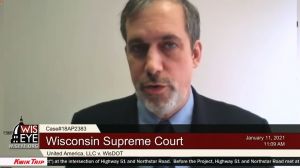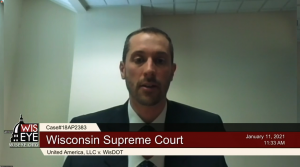Court considers scope of ‘lands’ definition in lawsuit over highway project
By: Michaela Paukner, [email protected]//January 11, 2021//
Court considers scope of ‘lands’ definition in lawsuit over highway project
By: Michaela Paukner, [email protected]//January 11, 2021//
The Wisconsin Supreme Court is considering what the Legislature meant by the word “lands” in a gas station owner’s lawsuit over a highway-expansion project that negatively impacted its business.
In 2004, United America bought a parcel of land in Lincoln County and operated a gas station and convenience store on the property. The land abutted Highway 51 to the east and Northstar Road to the north, but it did not have direct access to the highway. Drivers would turn off Highway 51 to Northstar Road to access the gas station.
In 2013, WisDOT began a highway safety improvement project at the intersection of Highway 51 and Northstar Road. The project changed Northstar Road to an overpass, meaning drivers couldn’t turn off the highway onto Northstar anymore.
United America lost about 90% of its business at the gas station due to the change in traffic pattern. It made an administrative claim under Wis. Stat. § 32.18, which provides that an owner of land abutting a project changing the grade of a street or highway can make a claim for damages to said land.
WisDOT denied the claim, and United America then brought a civil claim in the circuit court for damages under the same statute. A report from United America’s appraiser estimated that the property value went down $528,500 due to the change.
The circuit court ruled in favor of United America and entered judgment in the amount of $528,500 plus costs. The DOT appealed, arguing the statute’s plain language only allows compensation for physical or structural damage to the land itself. The Court of Appeals agreed and reversed the decision.
United America appealed to the state Supreme Court, asking the justices to interpret and determine the scope of the statutory language.

The court heard oral arguments in the case on Monday. Joseph Cincotta, who appeared for United America, said he believed “lands” and “property” to be synonymous and referenced definitions in the other sections of the statute.
“Lands is an appropriate term that includes interests and the value of lands,” Cincotta said. “It’s definitional, but we also think the statute itself supports that interpretation.”
Clayton Patrick Kawski, the attorney for WisDOT, disagreed. He said the appellate opinion uses structural or physical to describe what’s eligible for damages under 32.18, which would be the correct holding.
“If the statute used the word ‘property,’ maybe that would be a different case,” Kawski said, ” … but because it doesn’t and that’s a defined term in the statute, we have to look to that. The Legislature intentionally chose something different.”
The justices asked Cincotta how the case would stand if it had been brought forward as an inverse-condemnation claim.
“Don’t you wish you had brought this as an inverse condemnation to avoid some of the problems you’re coming into as a statutory approach?” Justice Ann Walsh Bradley said to Cincotta during his arguments.
Cincotta said it didn’t “seem so complicated” when he read the statute and debated the case before the circuit court. He thought he could bring both claims, but he believed the constitutional claim would have been set aside to deal with the statutory claim anyway.
“I think that I would risk an argument that I didn’t pursue the right claim or exhaust my statutory remedies,” Cincotta said. “32.18 seemed to apply here. There was no taking in the grade change during the highway project. It seemed to be quite applicable.”

When questioning Kawski, Chief Justice Pat Roggensack said regardless of whether the case is called a taking case, the landowner had no say, and the State had the right to do what it did.
“To me, it seems like we should be interpreting 32.18 as a remedial statute,” Roggensack said.
Kawski said he didn’t think it was a remedial statute because it creates a new right that didn’t exist previously.
“It doesn’t have any constitutional tether, unlike a takings situation that has some constitutional tether to say that we’re interfering directly with that person’s property rights,” Kawski said. “Here we’re not doing that.”
Kawski said the Legislature would have included “landowner” in the statute if it intended on 32.18 creating damages like those United is asking for.
Roggensack asked Cincotta during his rebuttal whether the suit was a taking case. She said the DOT’s argument seemed to be reading “structural” into 32.18 and imposing a standard that should be in 32.09, even though Cincotta hadn’t made a 32.09 case.
“It seems like we’re sliding two things together without parsing why they’re different,” Roggensack said.
Cincotta said he thought the case was broader than just addressing the structural damages in 32.09.
The state Supreme Court met in closed session following the arguments and will release its decision at a later date. Follow @“WLJreporter”
Legal News
- Former law enforcement praise state’s response brief in Steven Avery case
- Eric Toney announces re-election bid for Fond du Lac County District Attorney
- Former Wisconsin Democratic Rep. Peter Barca announces new bid for Congress
- Republicans file lawsuit challenging Evers’s partial vetoes to literacy bill
- More human remains believed those of missing woman wash up on Milwaukee Co. beach
- Vice President Harris returning to Wisconsin for third visit this year
- Wisconsin joins Feds, dozens of states to hold airlines accountable for bad behavior
- Trump ahead of Biden in new Marquette poll
- Bankruptcy court approves Milwaukee Marriott Downtown ‘business as usual’ motion
- New Crime Gun Intelligence Center to launch in Chicago
- Arrest warrant proposed for Minocqua Brewing owner who filed Lawsuit against Town of Minocqua
- Wisconsin Supreme Court justices question how much power Legislature should have
WLJ People
- Power 30 Personal Injury Attorneys – Russell Nicolet
- Power 30 Personal Injury Attorneys – Benjamin Nicolet
- Power 30 Personal Injury Attorneys – Dustin T. Woehl
- Power 30 Personal Injury Attorneys – Katherine Metzger
- Power 30 Personal Injury Attorneys – Joseph Ryan
- Power 30 Personal Injury Attorneys – James M. Ryan
- Power 30 Personal Injury Attorneys – Dana Wachs
- Power 30 Personal Injury Attorneys – Mark L. Thomsen
- Power 30 Personal Injury Attorneys – Matthew Lein
- Power 30 Personal Injury Attorneys – Jeffrey A. Pitman
- Power 30 Personal Injury Attorneys – William Pemberton
- Power 30 Personal Injury Attorneys – Howard S. Sicula











